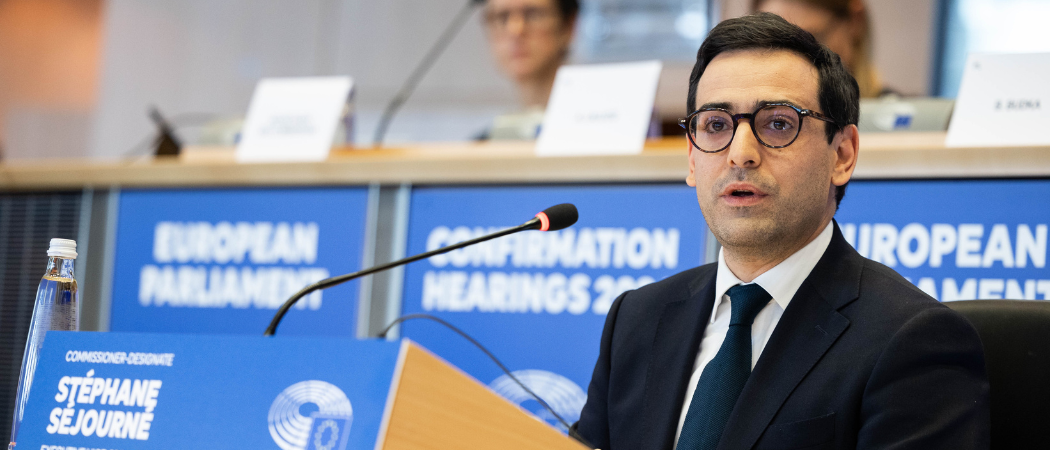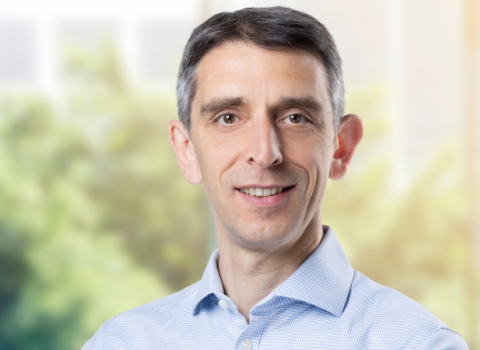More questions than answers, as candidate for EU industry portfolio outlines plans for office, but lacks detail on the Competitiveness Fund

Commissioner designate Stéphane Séjourné, up for the job of executive vice president for prosperity and industrial strategy, during his confirmation hearing at the European Parliament in Brussels. Photo credits: Jennifer Jacquemart / European Union
Commissioner designate Stéphane Séjourné, up for the job of executive vice president for prosperity and industrial strategy, outlined his vision for the proposed European Competitiveness Fund on Tuesday, providing just as many questions as answers.
The Competitiveness Fund is intended to be a one stop shop to support science and technology-based companies “from research and development through to scale up” to ensure they can grow in Europe, Séjourné told MEPs.
“It’s not about doing away with different funds, it’s about having a single access point that would then steer [a] company towards the most appropriate support,” he said.
But while in written answers prior to the hearing, Séjourné said, “EU spending, including for competitiveness, is spread over too many programmes, many of which fund the same things but with different requirements and difficulties to combine funding effectively,” during the hearing he declined to cite an example of overlapping funds which could be abolished, and suggested this would not be the focus of his efforts.
The Competitiveness Fund, first promised by EU President Ursula von der Leyen in her election campaign earlier this year, has similarities with the Strategic Technologies for Europe Platform (STEP), which she proposed in June 2023 to support industry and promote investment in key technologies.
In particular, a one stop shop is also the underlying principle of STEP, which launched earlier this year with a vastly scaled-down budget. In his hearing with MEPs, Piotr Serafin, Commissioner designate for budget, said STEP provides a glimpse of what could be expected in the Competitiveness Fund.
Séjourné told MEPs he wants to give companies across the bloc equal access to investment. “I hope we can look at cohesion criteria when it comes to the Clean Industrial Deal and the Competitiveness Fund,” he said. There were no details about what this would mean in practice.
Arm-in-arm with the commissioner for climate, Séjourné will be responsible for proposing a Clean Industrial Deal in the first 100 days of the mandate, focusing on decarbonisation, clean technologies and incentivising investment. He will also draw up an Industrial Decarbonisation Accelerator Act to support lead markets for clean tech, and speed up tendering and permitting processes.
He offered a broad vision of an industrial policy that combines both “defensive” trade instruments and an “offensive” approach with strategic partners. “The European industrial competitiveness strategy cannot be an amalgamation of different crisis response policies,” he said.
Lack of detail
The French politician and former MEP has a vast portfolio, which includes industry, SMEs and the single market. He confidently answered questions from MEPs from eight different committees, even if most of his responses added little to the 20-page written Q&A published last month.
“After a three-hour hearing, I do not know more about the European Competitiveness Fund,” wrote Julien Chicot, head of R&I policy at the Guild of European Research-Intensive Universities.
Chicot also noted a clear focus on scaling up rather than knowledge generation. “I wish Stéphane Séjourné and the MEPs had further discussed how an ambitious research policy could better contribute to Europe's competitiveness and resilience,” he said.
Ciarán Humphreys, research fellow at the Institute for Climate Economics think tank, welcomed Séjourné’s pledge to adopt a more proactive industrial policy, but said he is waiting to see which instruments and sectors will be targeted, and how this will be funded.
Humphreys believes the comments about a one stop shop are a sign Séjourné will defend programmes like Horizon Europe and the Innovation Fund. A memo leaked last month had raised the possibility of bundling all research and innovation programmes into the new Competitiveness Fund.
Séjourné’s comments could reassure the R&I community, but the devil is in the detail, Humphreys says. “The question is how effective [the one stop shop] will be, because we had the same idea with the STEP programme, and in the end, what was delivered was a website to guide companies,” he told Science|Business.
The Commission plans to develop a competitiveness coordination tool in conjunction with the Competitiveness Fund, to align investment priorities across member states and at EU level, which it hopes will maximise the fund’s impact.
Séjourné said the Competitiveness Fund should be “targeted, streamlined and flexible, with a funding toolbox with equity and guarantees,” and should derisk investments to leverage private funds, similar to the existing InvestEU programme.
He declined to speculate about the budget of the future fund, but did refer to Mario Draghi’s assessment that Europe needs to invest an additional €800 billion per year, which will require more synergies between public and private investors.
Von der Leyen has also asked Séjourné to set up new Important Projects of Common European Interest (IPCEIs), the strategic, cross-border projects that are exempt from state aid rules.
Rather than simply authorising state aid, Séjourné wants the Commission to be able to contribute to IPCEIs via the Competitiveness Fund, in addition to speeding up the validation process.
Strategic sectors
With both the Competitiveness Fund and the Clean Industrial Deal, Séjourné plans to focus on strategic sectors, including traditional industries such as steel, chemicals, and the automotive sector and on burgeoning cleantech, biotech, circular economy and digital sectors.
He blames the “scissors effect” of high energy costs and excess manufacturing capacity of China for “killing our industry”, and stressed the importance of supporting traditional industries in the green transition. He wants to focus on boosting demand for electric vehicles to help car makers meet climate targets, and pledged to bring forward plans for each sector.
Helping companies to implement new technologies will be crucial to boosting productivity. “We’ve done a lot of work at EU level on social acceptance of artificial intelligence amongst consumers. We haven’t done enough work on ensuring that new technologies are harnessed in production,” Séjourné said.
In addition, Séjourné promised an overhaul of rules for public procurement, which accounts for around 14% of EU GDP. The changes will give preference to European goods in strategic sectors, while factoring in more consideration of social and environmental standards.
There will be moves to strengthen the single market and additional support for SMEs. In particular, it is planned to introduce an SME passport, certifying a company’s SME status, to make it easier to access EU funds. There will be a focus on SMEs in the Clean Industrial Deal.
Thirty nine-year-old Séjourné led the Renew Europe group in the European Parliament until January 2024, when he returned to France to become minister for Europe and Foreign Affairs. A close ally of President Emmanuel Macron, he was drafted in as France’s commissioner nominee following the sudden resignation of Thierry Breton.
Séjourné’s approval and that of all executive vice presidents has been delayed by political wrangling. The conflict reflects a divided European Parliament following the recent elections, with right-wing groups threatening to block Spanish socialist Teresa Ribera, and the left threatening to reject Italian Raffaele Fitto, an ally of Giorgia Meloni.





 A unique international forum for public research organisations and companies to connect their external engagement with strategic interests around their R&D system.
A unique international forum for public research organisations and companies to connect their external engagement with strategic interests around their R&D system.